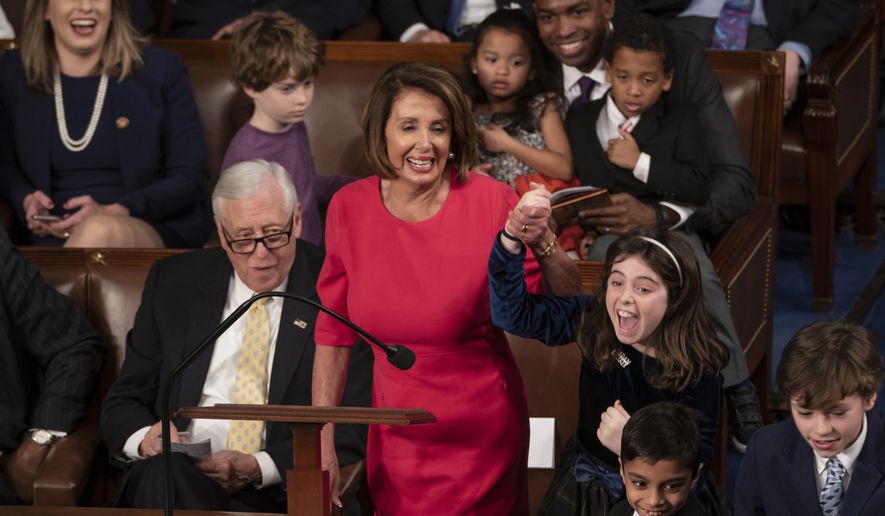Speaker Nancy Pelosi took the reins of power again Thursday as House members elected her to lead them in the 116th Congress, ushering in an era of Democratic control and creating a new check on President Trump.
Taking the gavel from Minority Leader Kevin McCarthy, California Republican, Mrs. Pelosi said she will look for areas of cooperation — but the list of priorities she set before her colleagues made clear that those chances will be few.
Among them are expanded gun control, legalization of illegal immigrant “Dreamers” and addressing a “disparity of income” in America. She said Democrats will bat down any attempts to reform federal entitlement programs such as Medicare and Social Security and declared global warming an “existential threat.”
“We have no illusions that our work will be easy and that all of us in this chamber will always agree,” she said. “But let each of us pledge that when we disagree, we respect each other and we respect the truth.”
Mrs. Pelosi was elected speaker with 220 votes. Mr. McCarthy received 192. A dozen Democrats voted for someone else, and three refused to take a stand and voted “present.”
The speaker will get an early chance to test Democrats’ unity amid the partial government shutdown that is about to turn 2 weeks old.
Her first ante, a package of bills to fully fund eight departments through the end of the fiscal year while giving the Homeland Security Department a one-month infusion of cash, is more theater than substance. Mr. Trump and Senate Majority Leader Mitch McConnell, Kentucky Republican, have said it’s a nonstarter.
The president congratulated Mrs. Pelosi on her ascendance and told reporters at the White House that he sees chances for cooperation with her.
“I think it’s actually going to work out. I think it’ll be a little bit different than a lot of people are thinking,” he said.
There has been little indication of cooperation over the past two years, when Mrs. Pelosi was minority leader and regularly clashed with Mr. Trump.
On Thursday, she called midterm election results that gave Democrats a net gain of about 40 House seats a “new dawn” for the country.
For Mrs. Pelosi, it’s a second coming as speaker. She served in the role from 2007 to 2011 but has been the Democratic floor leader far longer. She rose to the post of minority leader in 2002, took her troops to the majority in 2007, and lost the majority in 2011 before surging back this year.
Her long tenure was one of the reasons some Democrats gave for opposing Mrs. Pelosi, yet most sought to project an image of unity.
Rep. Bobby Scott, Virginia Democrat, said Mrs. Pelosi has the ability to wrest votes from various factions within the Democratic Caucus without resorting to threats.
“That’s one of the reasons she is such a strong candidate — because she can get the caucus together,” said Mr. Scott, who will be chairman of the Education and Labor Committee.
When he first entered Congress in the early 1990s, he said, Democrats routinely sustained dozens of defections on legislation. Mrs. Pelosi has ended that.
“She is one of the few people that knows the issues, knows the people [and can] bring everybody together. I don’t know anybody else in the caucus that could do it the way she does it,” he said.
Mrs. Pelosi struck several deals with her party’s moderates and liberals to win their support for her return to the top post.
Some of those were ratified Thursday when the House approved Democrats’ rules changes, including more time to read bills and a special committee to work on climate change.
The rules were approved on a 234-197 vote that broke largely along party lines. Three Democrats voted against the rules, and three Republicans sided with Mrs. Pelosi.
The dissenting Democrats complained that the rules reinstating pay-as-you-go requirements on new spending would hinder efforts to expand Obamacare into a more robust government-run health care system.
As he nominated Mrs. Pelosi for the speakership, House Democratic Caucus Chairman Hakeem S. Jeffries of New York said her legislative track record “is unparalleled in modern American history.”
“Nancy Pelosi is just getting started,” he said.
House Republican leaders, meanwhile, were happy with the unity the party displayed on the floor. Mr. McCarthy sustained just six defections from his diminished ranks.
“We even got Louie Gohmert,” crowed a House Republican leadership aide, referring to the ornery Texan who is a frequent thorn in the side of Republican leaders.
Mr. McCarthy, like Mrs. Pelosi, said Republicans will seek common ground where possible, though he vowed that his party won’t compromise on principles.
“Republicans will always choose personal freedom over government control,” he said.
Rep. John R. Moolenaar, Michigan Republican, said he doubted the bipartisan talk will last long.
“I expect the Democrats to work on legislation that satisfies the base of their party, and to the extent that they can advance those goals in the House, I think they’ll make every effort to do that,” Mr. Moolenaar said.
Mrs. Pelosi, in retaking the speakership, faces a different landscape than she did 12 years ago, when she was on the left wing of her caucus. Now a large number of liberals are pushing her on their issues.
House speakers are not technically required to be members of Congress, and Democrats gave votes to two outsiders: former Vice President Joseph R. Biden Jr. and Stacey Abrams, the losing Democratic candidate in Georgia’s gubernatorial election last year.
⦁ S.A. Miller contributed to this report.
• David Sherfinski can be reached at dsherfinski@washingtontimes.com.




Please read our comment policy before commenting.